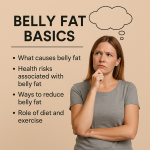Best Supplements for Belly Fat Loss in Women

Understanding Belly Fat: Why It’s Harder for Women to Lose
Belly fat isn’t just a cosmetic concern—it’s a complex health issue. Women tend to store more abdominal fat due to hormonal changes, particularly involving estrogen and cortisol. When estrogen levels drop (as seen during menopause), the body shifts fat storage from hips and thighs to the abdomen. This makes belly fat more persistent and harder to shed.
Types of Belly Fat: Subcutaneous vs. Visceral Fat
Subcutaneous fat sits just beneath the skin, while visceral fat surrounds internal organs. The latter is metabolically active and linked to increased risks of insulin resistance and heart disease. Understanding this difference helps tailor supplement and lifestyle strategies.
Hormonal Influence: How Estrogen and Cortisol Affect Fat Storage
High cortisol levels (stress hormone) signal your body to store fat around the abdomen. Pair that with fluctuating estrogen levels, and fat metabolism slows. Certain supplements—like omega-3s and green tea extract—can help balance these hormones naturally.
Common Myths About Belly Fat Reduction
-
Myth 1: You can “spot reduce” belly fat — ❌ Not true. Fat loss occurs systemically.
-
Myth 2: Supplements alone melt fat — ❌ They support the process but don’t replace a balanced diet and exercise.
-
Myth 3: Skipping meals speeds up fat loss — ❌ This can lower metabolism and backfire.
The Science Behind Fat-Loss Supplements
How Supplements Work: Boosting Metabolism and Fat Oxidation
Fat-loss supplements typically enhance thermogenesis (the body’s heat production), increase lipolysis (fat breakdown), and improve energy expenditure. Compounds like caffeine and green tea catechins are proven thermogenic agents.
Key Nutrients That Support Healthy Fat Loss
-
L-Carnitine helps transport fatty acids into cells for energy.
-
CLA supports body composition changes by reducing fat accumulation.
-
Vitamin D regulates metabolic processes and insulin sensitivity.
Safety and Effectiveness: What Clinical Studies Reveal
Most supplements are safe when taken within recommended doses. However, efficacy varies. According to a 2024 Journal of Nutritional Science review, combinations of green tea extract, caffeine, and CLA show the most promise for abdominal fat reduction in women.
Top 10 Best Supplements for Belly Fat Loss in Women

1. Green Tea Extract – Nature’s Fat-Burning Powerhouse
Rich in EGCG (epigallocatechin gallate), green tea extract increases fat oxidation and metabolic rate. Studies suggest it’s especially effective when combined with regular exercise.
2. L-Carnitine – Fueling Energy from Fat
L-Carnitine converts fat into usable energy. It’s best taken pre-workout to enhance endurance and promote fat utilization.
3. CLA (Conjugated Linoleic Acid) – Targeting Belly Fat Cells
CLA modifies enzymes that control fat storage, particularly around the abdomen. It’s widely recognized for its role in improving body composition.
4. Garcinia Cambogia – Appetite Control and Fat Metabolism
The active compound HCA (hydroxycitric acid) suppresses appetite and inhibits fat production. While results vary, it can help reduce calorie intake.
5. Probiotics – Gut Health’s Hidden Role in Weight Management
A healthy gut microbiome influences weight regulation. Strains like Lactobacillus gasseri have shown to reduce abdominal fat in women.
6. Caffeine – Natural Thermogenic Booster
Caffeine is one of the most well-studied fat-loss ingredients. It stimulates the central nervous system, increasing alertness and metabolic rate while promoting lipolysis — the breakdown of fats for energy. A moderate caffeine intake (200–400 mg per day) can elevate thermogenesis by up to 11%, according to The American Journal of Clinical Nutrition.
It’s especially beneficial for women who exercise regularly, as caffeine enhances endurance and performance. However, avoid overuse to prevent side effects like jitteriness or insomnia.
7. Apple Cider Vinegar – Supporting Blood Sugar and Fat Breakdown
Apple cider vinegar (ACV) isn’t just a kitchen staple—it’s a metabolic aid. The acetic acid in ACV helps stabilize blood sugar and improve insulin sensitivity, two key factors for belly fat reduction. Studies suggest that consistent use of 1–2 tablespoons daily, diluted in water, can help reduce visceral fat over time.
It also supports satiety, helping women avoid overeating, especially after carb-heavy meals. Just be cautious with acidity—dilution is essential to protect your teeth and digestive tract.
8. Omega-3 Fatty Acids – Balancing Hormones and Reducing Inflammation
Omega-3s (found in fish oil, chia seeds, and flaxseeds) are essential for hormonal balance. These healthy fats reduce inflammation, a major contributor to belly fat retention, and can help regulate cortisol and insulin levels.
Women with low omega-3 intake often experience higher fat storage due to imbalanced hormones. Adding 1–3 grams daily can support both heart and metabolic health, making it a must-have supplement in your fat-loss routine.
9. Protein Powders – Preserving Lean Muscle During Weight Loss
High-quality protein supplements (like whey isolate or plant-based blends) promote satiety, support lean muscle mass, and enhance post-exercise recovery. Increasing protein intake helps boost metabolism, since protein requires more energy to digest compared to fats or carbs.
Replacing one meal with a protein shake can help reduce overall calorie intake while keeping you full for longer. Look for options with minimal added sugars and at least 20g of protein per serving.
10. Vitamin D – The Hormone-Like Vitamin for Fat Regulation
Vitamin D acts more like a hormone than a vitamin. Low levels are linked to increased belly fat, insulin resistance, and hormonal imbalance in women. A 2023 Journal of Endocrine Health study found that women with sufficient Vitamin D levels had significantly lower waist circumference.
Natural sunlight exposure, fatty fish, and fortified foods are great sources. For those deficient, supplementation (1,000–2,000 IU daily) can improve metabolic function and fat oxidation.
How to Choose the Right Supplement for Your Body Type
Understanding Your Metabolic Profile
Each woman’s metabolism is unique. Age, hormonal health, activity level, and stress all influence how your body stores fat. If you’re perimenopausal or postmenopausal, consider supplements like omega-3s and CLA that target hormonal fat distribution.
Reading Labels: What to Look for (and Avoid)
Always check:
-
Active ingredient concentrations
-
Third-party testing or certification
-
Transparent labeling (no proprietary blends)
Avoid supplements with artificial fillers, high sugar content, or unverified claims.
Consulting Healthcare Professionals Before Use
Before starting any supplement, especially if you have existing conditions (like thyroid disorders or hypertension), consult your doctor or a registered dietitian. They can help tailor a supplement plan that aligns with your individual health needs.
Lifestyle Tips to Enhance Supplement Results
Nutrition: Best Foods That Complement Fat-Burning Supplements
Pair supplements with whole foods like lean proteins, leafy greens, berries, and healthy fats. These support liver function, detoxification, and stable energy levels—all crucial for effective fat metabolism.
Exercise: Combining Cardio and Strength Training for Better Results
A combination of HIIT (High-Intensity Interval Training) and resistance training maximizes fat oxidation. Cardio burns calories immediately, while muscle-building increases long-term metabolic rate. Supplements like caffeine or L-carnitine can boost performance during these workouts.
Sleep and Stress: The Overlooked Factors in Fat Retention
Chronic stress elevates cortisol, which promotes belly fat storage. Aim for 7–8 hours of sleep nightly, practice mindfulness, and limit stimulants late in the day. Supplements like omega-3s and magnesium can also help regulate stress hormones.
Potential Side Effects and Safety Considerations
Safe Dosage and Proper Timing
Even natural supplements can cause issues if overused.
-
Caffeine: Limit to 400 mg/day
-
CLA: 3–6 grams/day
-
Green Tea Extract: 250–500 mg EGCG/day
-
Apple Cider Vinegar: 15–30 mL/day (diluted)
Take fat-burning supplements with meals to reduce stomach irritation and enhance absorption.
Interactions with Medications or Hormonal Conditions
Certain supplements (like caffeine or Garcinia Cambogia) may interfere with medications for anxiety, blood pressure, or hormonal therapy. Always cross-check ingredients and consult your doctor before combining products.
FAQs About Belly Fat Loss Supplements for Women
1. Are fat-loss supplements safe for long-term use?
Most are safe when used responsibly. Stick to clinically tested ingredients and cycle your supplements every 8–12 weeks to avoid tolerance buildup.
2. Can supplements alone help reduce belly fat?
No. Supplements enhance the effects of a healthy diet and exercise plan—they don’t replace them.
3. Which supplement is best for hormonal belly fat?
Omega-3s, CLA, and Vitamin D are most effective for balancing hormones and reducing midsection fat.
4. Do probiotics really help with fat loss?
Yes. Probiotics improve gut health, reduce inflammation, and regulate hunger hormones, all of which support belly fat loss.
5. What’s the best time of day to take fat-loss supplements?
-
Caffeine and L-Carnitine: Before workouts
-
Green Tea Extract and CLA: With meals
-
Probiotics and Omega-3s: Morning or evening with food
6. Are natural supplements better than synthetic ones?
Generally, yes. Natural supplements have fewer side effects and offer added nutrients. However, ensure they’re from reputable sources with verified purity.
Conclusion: The Smart Way to Use Supplements for Belly Fat Loss
The best supplements for belly fat loss in women work synergistically with proper nutrition, exercise, and stress management. While they’re powerful tools, the real magic lies in consistency—pairing evidence-based supplements with a healthy lifestyle.
Focus on scientifically backed options like green tea extract, CLA, omega-3s, and probiotics for sustainable, hormone-friendly fat loss. Remember, the goal isn’t just a flatter stomach—it’s a healthier, stronger, and more confident you.
For more information on clinical studies and supplement safety, visit National Institutes of Health Office of Dietary Supplements.


